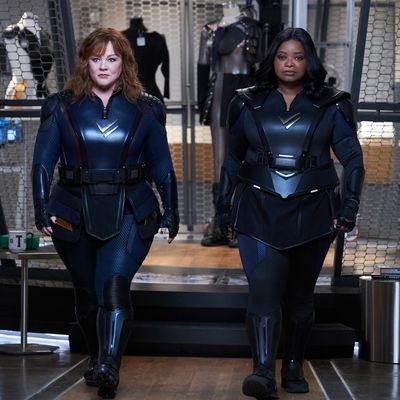
There’s a line in Taffy Brodesser-Akner’s 2018 profile of Melissa McCarthy that has stayed with me ever since I first read it, having to do with the star’s home life with her husband and regular collaborator, Ben Falcone. “At night,” Brodesser-Akner wrote, “she and Falcone, who directed Life of the Party, Tammy and The Boss, sit in what they call their old-people chairs with glasses of Scotch and talk about whether comedy can be saved.” It’s a striking image, the couple cozying up each evening to hold a symposium of two about the genre they love — a genre that has, in its most straightforward form, been struggling for space on the big screen for a while now. It’s also an image that’s impossible to reconcile with something like Thunder Force, their new movie, which is now out on Netflix. How can people who purport to love comedy so much turn out something so lackadaisical and joyless? Especially Melissa McCarthy, a performer who beams out warmth like a SAD lamp, and who’s proven herself capable of making the most underwhelming material funny through sheer force of will.
Thunder Force is the fifth film to come from Falcone and McCarthy’s filmmaking efforts (though they’ve also produced or appeared together in other projects), and the one with the most audience-friendly hook, which makes its muddled nature especially confounding. It’s a superhero riff, with McCarthy playing a cheerful dirtbag named Lydia who becomes the unintended recipient of superhuman strength when visiting the lab of mogul Emily (Octavia Spencer), who’s devoted her life to figuring out a way to unlock powers in regular people. The two were childhood friends before a falling out — McCarthy’s daughter Vivian Falcone plays her character as a kid, and the resemblance is striking — and after Emily gives herself the power of invisibility, they team up to fight crime. Simple enough, except that the movie feels the need to establish that its universe is already filled with superpowered antagonists, thanks to a pulse of interstellar rays that, in 1983, created genetic mutations, but only in sociopaths who are dubbed “Miscreants.” It’s not like anyone expects a goofy comedy to unfurl MCU-detailed world-building, but this odd, unnecessary introduction raises so many questions that go unanswered. Why does it take almost four decades for supervillainy to come to a head? Why are the efforts to combat them entirely confined to Chicago?
Why, after laying out this concept, does the movie then give a whole other backstory to the Crab (Jason Bateman), a noncommittal henchman whose mutation is crustacean arms? Bateman admittedly manages to get the biggest laugh in Thunder Force by po-facedly shuffling sideways out of the frame. That bar is low, though — Spencer, cast as the straight woman in the main duo, barely engages with her scenes, while McCarthy labors to make overlong gags work. There’s one involving Lydia’s powers making her crave raw chicken, and the movie returns to it repeatedly without ever making the bit look gross enough for it actually rise to the level of funny. There’s a notes-scrawled-on-a-napkin sloppiness to the screenplay that Falcone’s direction does nothing to mitigate, with long, slack sequences that play like rehearsals for a real thing that no one had time for. There are not one but two scenes in which Lydia and Emily sing along to a song they like, as though the movie meant to cut one but forgot. There’s a recurring joke about the women having trouble getting in and out of their car that never makes it clear if the car is meant to be too small, or too low to the ground, or if their costumes are too constrictive.
Thunder Force doesn’t work as a comedy, but that’s because it doesn’t really work as a movie. There’s so little chemistry between McCarthy and Spencer, longtime real-life friends, that, rather than buddies, their characters often just come across as mildly surprised to find themselves in the same room. As Emily’s teen genius daughter, Tracy, Taylor Mosby is given a barely discernible arc. Bobby Cannavale and Pom Klementieff try to camp up villains who barely register as presences, while Melissa Leo plays a character so thankless that her eventual betrayal is basically broadcast from the start. And the superheroic action is so poorly handled that it’s often hard to tell what’s meant to be happening in scenes, much less get what’s supposed to be funny about it. An early attempt to stop a robbery is so poorly blocked and framed that a gag about Lydia accidentally high-jumping into the acoustic tiled ceiling doesn’t land. And a sequence in which Lydia impulsively picks up and hurls a bus is a joke with no punch line, as though no one remembered to shoot the bit in which it misses its target and lands elsewhere. Whether comedy needs saving is arguable — it’s thriving on plenty of platforms. But if its big, studio-movie incarnation is fading out, Thunder Force isn’t about to save the day, superpowers or not.





